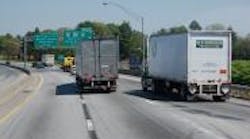“Looking ahead for the job market, there does not seem to be much optimism.” –From a recent Harris Poll was conducted online in the U.S. in August.
The freight picture is getting cloudy again, it seems, but not so much by the numbers. Indeed, tonnage remained made some positive strides as the summer progressed, with the American Trucking Associations (ATA) for-hire truck tonnage index increasing 1.5% in July, after falling a revised 1.6% in June.
Yet, even though tonnage is up 6.7% through the first half of 2010 compared to the same period in 2009, the economic road seems to be getting suddenly rougher. “The economy is slowing and truck freight tonnage has essentially gone sideways since April 2010,” noted Bob Costello, ATA’s chief economist.
His forecast is for “subdued” tonnage growth in the months ahead, though freight should likely see some moderate gains in the second half of the year because the reduction in supply since the start of the recession means that even small improvements in tonnage will have a larger impact on the industry than in past.
OK, that’s the numbers side of things. On the more emotive, human side of the economic picture, recent polls show folks are mighty worried about the economy and especially about the job picture. So when folks get worried, they don’t buy things, meaning the need to ship goods to stores falls off – potentially leading to a drop in freight demand.
Take the results from a couple of recent Harris Interactive polls, for example. In one about jobs, two-thirds of those polled (66%) say the current job market of their region is bad, with 22% saying it is neither good nor bad and only 12% saying it is good.
Looking at it by region, those in the Midwest and West are feeling these employment problems the most, according to Harris’ data, with seven in 10 Westerners (71%) and Midwesterners (70%) considering the current job market bad. The job market in the East seems the "best" as almost one in five Easterners (17%) say it is good while three in five (60%) say it is bad.
Looking ahead for the job market, there does not seem to be much optimism, Harris reported. When asked how they think the job market in their region will change in the next six months, over one-quarter of U.S. adults (27%) say it will get worse, half (49%) believe it will remain the same and under one-quarter (23%) believe it will get better.
“Regardless of any positive indicators for the overall economy, if jobs are always something on people's minds, Americans will not believe those positive indicators,” Harris noted in its research. “The high unemployment numbers are something people can see on a regular basis and, while they may not have large concerns about losing their jobs, they know the job market is not good.”
People are divided as to what the upcoming year will bring economically. Two in five U.S. adults (39%) say the economy will stay the same in the coming year while one-third (32%) say it will get worse and three in ten (29%) believe it will improve, according to Harris’ poll results. Americans are a little more pessimistic now than they were in June when 30% believed things would improve, 42% thought they would stay the same and 28% said the economy would get worse in the coming year.
Bringing it closer to home, over half of Americans (52%) say they expect their household's financial condition to remain the same in the next six months while just over one-quarter (26%) say it will get worse and just under one-quarter (22%) believe it will get better, Harris noted in its poll results.
These feelings are almost unchanged from June when 52% believed their household's financial condition would remain the same over six months, 21% felt it would get better and 27% thought their household's financial condition would get worse, the firm said.
While some economists talk about a double dip recession and others say the economic crisis is over, the American public is not of one mind on this issue, Harris pointed out. In thinking about the current economic crisis, one-third (34%) believe the worst is still to come, one-third (33%) say the worst is over and one-third (32%) are not at all sure.
A nationwide survey of more than 4,400 workers by CareerBuilder conducted between May to June this year adds to the gloomy outlook.
Although this data is older by several months, with the recent spate of bad economic news lately – with the National Assn. of Realtors reporting sales of previously owned homes falling 27.2% in July from June this year, for example; the lowest level since the group started tracking the data in 1999 – one can almost be sure the gloomy feeling is being reinforced.
CareerBuilder’s survey found nearly eight-in-ten (77%) workers report that they live paycheck to paycheck to make ends meet; up from 61% of workers back in 2009. Workers went on to say that sometimes they are unable to make ends meet at all, with one-in-five (22%) saying they have missed payments on bills in the last year.
Some workers are making ends meet by dipping into their long-term savings, CareerBuilder found, with more than one-in-five (21%) saying they reduced their 401(k) contributions or personal savings in the last year to get by.
These are not the kind of numbers one wants to see when trying to plot the future of freight demand for truckers. Let's hope then that things revive a bit -- especially in the job market -- so the ongoing recovery in the freight market doesn't grind to a halt.






